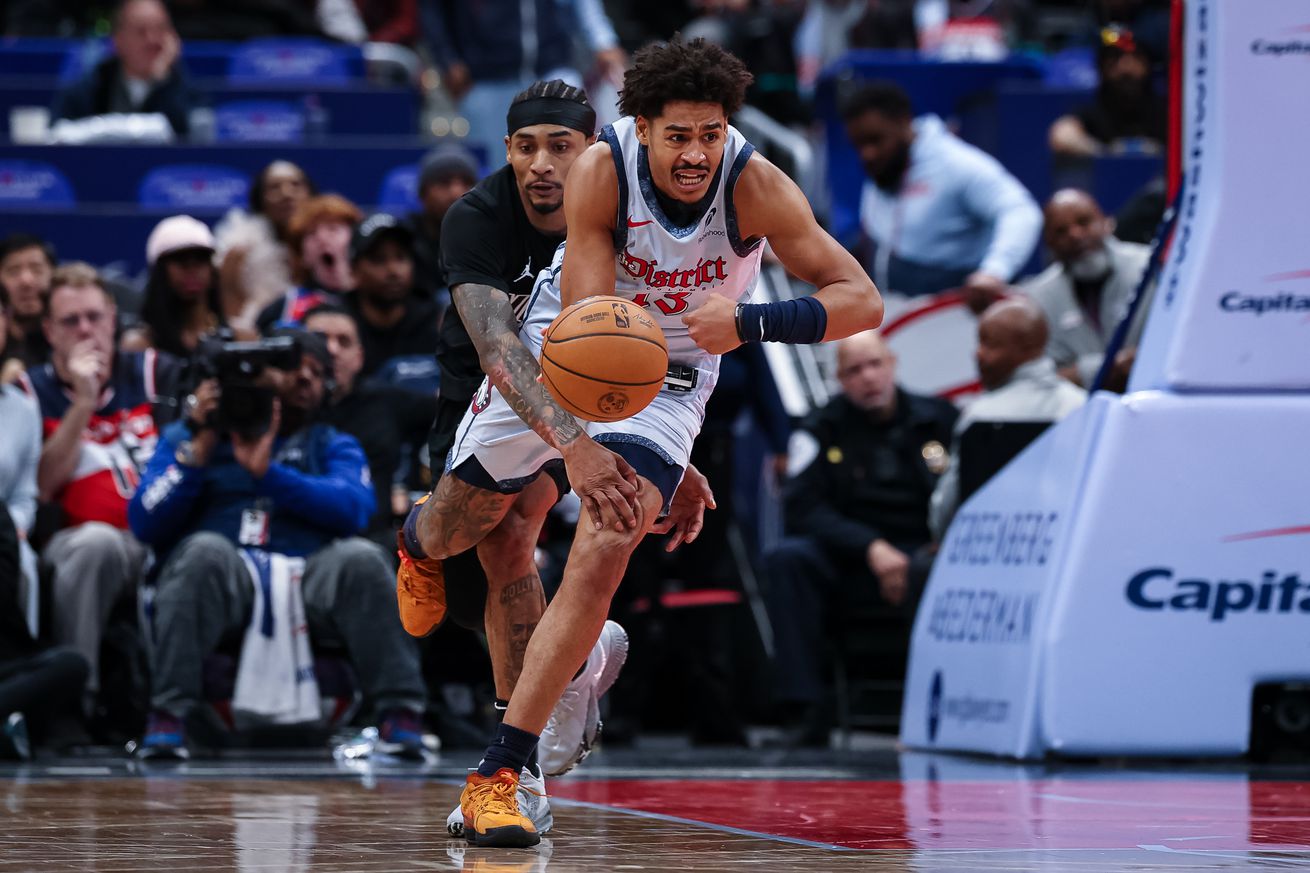
Stats, analysis, commentary
The Washington Wizards earned their 10th win of the season with tough defense in the fourth quarter, impassioned play throughout, and a few timely dumb plays from the Brooklyn Nets.
Head coach Brian Keefe closed a tense and chippy contest with a veteran group that included Marcus Smart, Khris Middleton, Richaun Holmes, Jordan Poole, and Bilal Coulibaly. The group repeatedly forced the Nets into tough shots in the fourth quarter. Smart contributed several strong defense possessions, which included a steal and drawing an offensive foul.
Brooklyn’s depleted roster — they’ve offloaded veterans all season, the latest being Ben Simmons — helped with those aforementioned dumb plays. Things like Nic Claxton getting a flagrant foul for shoving an airborne Justin Champagnie. Or Trendon Watford getting a technical for pushing Bilal Coulibaly in the back in the final minute of a close game, which Ziaire Williams then compounded by committing an away-from-play foul on the inbounds play.
By the time the free throw parade ended, the Wizards had gone from up four with 13 seconds to play to up eight with eight seconds to play.
Bright Spots for the Wizards
- Jordan Poole played a super-efficient game, scoring 26 points on just 13 shots. His eFG% was 80.8%. He made a few head-scratching decisions, and I’m still not entirely convinced there’s much difference between his good and bad games other than making or missing shots, BUT he played very well in the win, and he hit some big shots late in the game to secure the win.
- Pushed into the starting lineup by the trade of Jonas Valanciunas, and the ankle injury to Alex Sarr, Richaun Holmes continues to play with effort and power. Last night, 11 points on 3 field goal attempts, 6 rebounds, 4 assists (!), a steal, and 4 blocks (!) in 30 minutes.
- Kyshawn George — the 21-year-old rookie — posted a 136 PPA (see below) despite 5 turnovers. He did it with decent shooting and strong defense — 3 steals, 3 blocks, and a team defense that was at its best when he was out there.
- Bilal Coulibaly was aggressive offensively in the first quarter and then seemed to recede. Still, he finished with a 114 offensive rating on a 26.2% usage rate.
- Justin Champagnie grabbed 7 rebounds in just 13 minutes of action.
- For the first time this season, the Wizards held an opponent below 100 points.
Four Factors
Below are the four factors that decide wins and losses in basketball — shooting (efg), rebounding (offensive rebounds), ball handling (turnovers), fouling (free throws made).
The four factors are measured by:
- eFG% (effective field goal percentage, which accounts for the three-point shot)
- OREB% (offensive rebound percentage)
- TOV% (turnover percentage — turnovers divided by possessions)
- FTM/FGA (free throws made divided by field goal attempts)
In the table below are the four factors using the percentages and rates traditionally presented. There’s also a column showing league average in each of the categories to give a sense of each team’s performance relative to the rest of the league this season.
Stats & Metrics
Below are a few performance metrics. PPA is my overall production metric, which credits players for things they do that help a team win (scoring, rebounding, playmaking, defending) and dings them for things that hurt (missed shots, turnovers, bad defense, fouls).
PPA is a per possession metric designed for larger data sets. In small sample sizes, the numbers can get weird. In PPA, 100 is average, higher is better and replacement level is 45. For a single game, replacement level isn’t much use, and I reiterate the caution about small samples sometimes producing weird results.
POSS is the number of possessions each player was on the floor in this game.
ORTG = offensive rating, which is points produced per individual possessions x 100. League average last season was 114.8. Points produced is not the same as points scored. It includes the value of assists and offensive rebounds, as well as sharing credit when receiving an assist.
USG = offensive usage rate. Average is 20%.
ORTG and USG are versions of stats created by former Wizards assistant coach Dean Oliver and modified by me. ORTG is an efficiency measure that accounts for the value of shooting, offensive rebounds, assists and turnovers. USG includes shooting from the floor and free throw line, offensive rebounds, assists and turnovers.
+PTS = “Plus Points” is a measure of the points gained or lost by each player based on their efficiency in this game compared to league average efficiency on the same number of possessions. A player with an offensive rating (points produced per possession x 100) of 100 who uses 20 possessions would produce 20 points. If the league average efficiency is 114, the league — on average — would produced 22.8 points in the same 20 possessions. So, the player in this hypothetical would have a +PTS score of -2.8.
Players are sorted by total production in the game.
